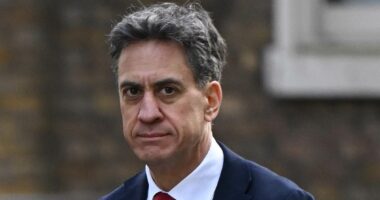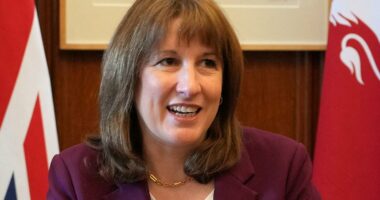Share this @internewscast.com
Rachel Reeves has attributed the chaos surrounding her Budget to sexism, urging Labour MPs to rally behind her plans.
As she gears up to present her much-anticipated economic package tomorrow, the Chancellor made an urgent plea to her uneasy backbenchers.
Reeves acknowledged that workers might face another wave of tax increases, despite her previous commitment a year ago not to seek further funding through taxes.
Nonetheless, she emphasized her commitment to eliminating the two-child benefit cap, which forms part of an anticipated £15 billion expansion in welfare spending.
In addition to Brexit, Tory austerity, and Donald Trump, which she has previously cited as reasons for the current financial gap, Reeves now claims to be a victim of ‘misogyny.’

Chancellor Rachel Reeves made a desperate appeal to restive backbenchers as she prepares to deliver the long-awaited package tomorrow
The economy has suffered amid weeks of turbulent discussions, during which the Chancellor initially supported an income tax increase, only to retract the proposal in a humiliating reversal.
However, there is still set to be pain for ordinary Britons, with fears of ‘death by a thousand tax rises’ as Ms Reeves tries to fill a black hole estimated at up to £35billion.
The Financial Times reported today that the Treasury has been urging banks to speak up for the government’s policies.
Health Secretary Wes Streeting is expected to confirm this morning that the ‘sugar tax’ will be extended to cover milkshakes and lattes.
Treasury sources have been all-but confirming that the hated freeze on tax thresholds will be kept in place for another two years.
That ‘stealth raid’ will raise billions of pounds by dragging millions of people deeper into the tax system.
Experts said that continuing the freeze amounted to Labour reneging on past promises not to increase taxes on working people.
At the gathering of the Parliamentary Labour Party, Ms Reeves told MPs that politics is a ‘team sport’.
Ms Reeves also described the Budget as a ‘package’ not a ‘pick ‘n’ mix’, urging MPs to back the whole of it rather than single out parts they dislike for criticism.
She acknowledged that Labour backbenchers will not be content with some elements of the plans.
Laying out three priorities, she said: ‘Cutting the cost of living, cutting NHS waiting lists and cutting the cost of debt.’
Allies said the Chancellor delivered a message that ‘united parties win elections’.
But she also hit out at ‘armchair’ critics questioning whether she could do the job.
‘I don’t think even I had recognised the misogyny that still exists in public life,’ she said.
In a defiant message, Ms Reeves said: ‘I’ll show the media, I’ll show the Tories, I’ll not let them beat me. I’ll be there on Wednesday, I’ll be there next year and I’ll be back the year after that.’
Health minister Karyn Smith was sent out to bat for the government this morning, and faced questions over whether it was true that Ms Reeves had faced misogyny.
She told Times Radio: ‘Look, Rachel is well able to challenge and relishes the challenge that she has got as the first female Chancellor.
‘I think both things can be true. I think absolutely, I’m often in a situation where I’m the only woman in the room.
‘That happens to Rachel a lot in her world, but all chancellors face a lot of criticism. She’s well up for that challenge, able to face that down.
‘I think it is inspirational to lots of young women, particularly she’s the first Chancellor, woman Chancellor in 300 years, something she’s very proud of, and rightly so. With that comes a lot of criticism.
‘Every single Chancellor gets criticism… I think there is a difference for a woman Chancellor as well, absolutely, for all women politicians, that not new or unusual.
‘But you know, those of us who are in senior positions in politics, we’ve got to crack on with it. We’re focused on it: it is one of those things that you have to deal with.
‘I hope it changes – and our job is to inspire another generation, which I know Rachel does do, to get involved and change that situation.’
What should you expect in Rachel Reeves’ second Budget tomorrow?
When she finally delivers her Budget on 26 November, Rachel Reeves will end months of rumours and briefings about possible new levies.
The uncertainty caused by the speculation is judged to have choked off economic growth, by causing ‘paralysis’ among UK businesses and consumers.
Sir Lindsay Hoyle, the Speaker of the House of Commons, has even mocked the ‘hokey cokey’ Budget process, following Ms Reeves’ chaotic U-turn on income tax.
At the beginning of this month, the Chancellor laid the groundwork for a manifesto-busting hike to income tax rates.
But she was later revealed to have scrapped plans to increase income tax rates by 2p, while cutting National Insurance by the same amount.
She is instead expected to announce a ‘smorgasbord’ of other levy hikes as she scrambles to fill a multi-billion pound hole in the public finances.
So, following months of chaotic speculation, here’s what the Chancellor is expected to announce on Wednesday…
A ‘mansion tax’
The owners of more expensive homes face being hit with a new ‘mansion tax’ worth an average of £4,500.
The property levy will reportedly be collected through council tax bills and charged on homes worth more than £2million.
More than 100,000 properties would be impacted by such a charge, which could raise around £450million for the Treasury.
The move will reportedly see the revalulation of around 2.4million properties across council tax bands F, G and H – and potentially huge numbers pushed into higher bands.
Homeowners are expected to be allowed to defer paying the ‘mansion tax’ until they move house or die, to avoid people having to sell up to cover the cost.
Experts have warned it will damage the property market at a time when the Government is looking to build 1.5million more homes.
A freeze on income tax thresholds
The Chancellor is expected to freeze income tax thresholds for an extra two years to 2030.
If she also keeps National Insurance thresholds at their current rate, Ms Reeves would raise around £8billion with the move.
Freezing income tax thresholds is known as a ‘stealth tax’ as it drags more people into paying tax for the first time, or shifted onto higher rates, as wages go up.
A current freeze on income tax thresholds, first introduced in April 2023, was due to expire in 2028.
A raid on workplace pensions
Ms Reeves is targeting a £3billion raid on the ‘salary-sacrifice’ schemes used by millions of private-sector workers.
Under salary-sacrifice schemes, workers accept a lower wage each month and their employer makes an equivalent pension contribution.
This cuts their National Insurance liability, with firms and staff usually splitting the saving.
National Insurance is charged at 15 per cent for employers and at 8 per cent on employee earnings less than £50,270, with 2 per cent charged on income above that.
The tax break was created to encourage pension saving and costs the Treasury £4billion a year.
Ms Reeves has been considering capping the salary that can be ‘sacrificed’ at just £2,000, saving the Treasury about £2billion.
But the Financial Times reported that the Treasury now wants to save £3billion to £4billion, suggesting it will be scaled back further or axed.
A survey by the Confederation for British Industry (CBI) suggested few firms would absorb the costs if salary sacrifice schemes were axed, or National Insurance was charged above a new cap.
They warned workers’ pension pots could be worth tens of thousands of pounds less if Ms Reeves presses ahead with a Budget raid.
A pay-per-mile tax for electric cars
The Chancellor is said to be considering a 3p per mile tax for electric vehicles (EVs).
It is estimated this will increase the average cost of owning an EV by £276 a year, while it would raise about £375million for the Treasury each year based on the number of EVs now on the road.
A pay-per-mile levy is designed to plug the looming gap caused by a collapse in fuel duty as drivers move away from petrol and diesel cars.
But experts say it could cause the EV market to stall.
In a bid to strengthen the EV market, Ms Reeves will add £1.3billion to a grant that knocks up to £3,750 off the price of an electric vehicle.
It will be part of a package that will also see £200million go towards the rollout of charging points.
Campaigners have urged the Chancellor to keep fuel duty frozen at her Budget, in order to protect hard-pressed motorists.

The Chancellor is said to be considering a 3p per mile tax for electric vehicles (EVs)
Scrapping the two-child benefit cap
Ms Reeves is widely expected to bow to pressure from Labour MPs by scrapping the two-child benefit cap.
This currently prevents parents from claiming Universal Credit or child tax credit for a third or additional child born after April 2017.
It is estimated that scrapping the cap entirely, which is being demanded by both Labour MPs and charities, would cost around £3.5billion a year.
The Tories have warned it would be ‘irresponsible’ to scrap the two-child limit – and add billions more to the welfare bill – at a time when Ms Reeves faces having to hike taxes to fill a hole in the public finances.
As well as scrapping the two-child benefit cap, the Chancellor is expected to confirm working-age benefits – such as Universal Credit, PIP, and child benefits – will be uprated in line with inflation at a cost of around £6billion.
A cut to the ISA limit
The Chancellor is poised to slash the annual cash ISA limit to £12,000 from £20,000.
It is part of an effort by Ms Reeves to encourage Brits to instead invest their savings into stocks and shares.
But the House of Commons Treasury committee has warned that cutting the cash ISA allowance is ‘unlikely to incentivise people to invest their cash in stocks and shares’.
They said ‘knock-on effects’ could include a less competitive mortgage market as building societies depend on cash ISA savings as a critical funding source for their lending.
A ‘taxi tax’
Ahead of the Budget, the Treasury refused to rule out slapping 20 per cent VAT on private hire fares.
Industry experts reckon a ‘taxi tax’ would raise £750million a year for the Treasury – but would add £2 to £3 to a typical £12 journey.
At present, taxi operators outside London do not have to charge VAT on journeys because their drivers are self-employed and they typically remain under the VAT threshold by earning less than £90,000.
Women’s rights campaigners have urged the Chancellor not to do anything that hikes the cost of taxis as it would put more vulnerable people at greater risk.
They pointed out that many women choose to get a taxi late at night, rather than walking home in the dark or relying on public transport.
A consultation on the VAT treatment of private hire vehicles was launched under the previous Tory government following a court case.
A ‘milkshake tax’
Ms Reeves is expected to introduce a ‘milkshake tax’ by ending the exemption dairy-based beverages have from tax on sugary drinks.
The ‘sugar tax’ – formally known as the Soft Drinks Industry Levy – was introduced in 2018 to combat obesity.
But milkshakes were left out due to fears that hiking the price would cut children’s calcium intake.
Producers pay at least 18p per litre on soft drinks containing 5g or more of sugar per 100ml.
As well as ending the dairy exemption, the Chancellor is reportedly planning to cut the threshold to 4g per 100ml.

Ms Reeves has suggested she could raise taxes on betting firms at the Budget and said the Treasury had been ‘taking evidence’ on the issue
New gambling taxes
Ms Reeves has suggested she could raise taxes on betting firms at the Budget and said the Treasury had been ‘taking evidence’ on the issue.
Former Labour PM Gordon Brown has been among those calling for the Chancellor to hike levies on the ‘undertaxed’ gambling industry.
He has urged Ms Reeves to increase various gambling taxes in order to raise revenues to cover the cost of scrapping the two-child benefit cap.
But the Betting and Gaming Council, which represents gambling companies, warned the ‘economically reckless’ plan would push gamblers into the black market.
Minimum wage rises
The Chancellor is expected to confirm that the minimum wage for workers over 21 will rise by about 4.1 per cent to around £12.71 an hour.
The Low Pay Commission, an independent body that advises the Government on minimum wage rates, is also said to have recommended an increase of 8 per cent to the current £10 an hour for workers aged 18-20.
In its manifesto prior to last year’s general election, Labour promised to ensure all adults are entitled to the same minimum wage.
















